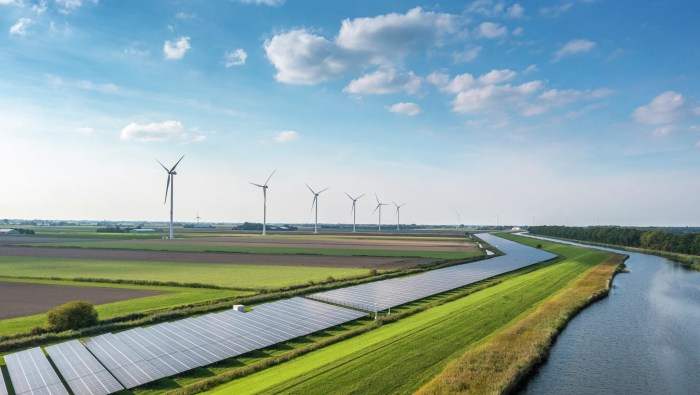Renewable energy insurance sets the stage for this enthralling narrative, offering readers a glimpse into a story that is rich in detail with American high school hip style and brimming with originality from the outset.
As the renewable energy industry continues to grow, the need for adequate insurance coverage becomes paramount. From protecting solar farms to wind turbine installations, renewable energy insurance plays a crucial role in safeguarding projects and investments. Let’s dive into the world of renewable energy insurance to uncover its significance and impact.
Overview of Renewable Energy Insurance
Renewable energy insurance plays a crucial role in the renewable energy industry by providing protection against potential risks and uncertainties associated with renewable energy projects. It helps project developers and investors mitigate financial losses and ensure the successful completion and operation of renewable energy projects.
Types of Insurance Coverage
- Property Insurance: Covers physical assets such as solar panels, wind turbines, and other equipment from damages due to natural disasters or accidents.
- Liability Insurance: Protects against third-party claims for bodily injury or property damage arising from the operation of renewable energy projects.
- Business Interruption Insurance: Compensates for lost income and additional expenses in case of project downtime due to covered risks.
Benefits of Renewable Energy Insurance
- Financial Protection: Helps safeguard investments and ensures financial stability by covering potential losses.
- Risk Management: Minimizes risks associated with project development, construction, and operation, enhancing project viability.
- Compliance Requirement: Often required by lenders and investors to protect their financial interests and ensure project success.
Factors Influencing Renewable Energy Insurance
Renewable energy insurance costs are influenced by various factors that impact the overall risk associated with insuring these projects. Understanding these factors is crucial for both insurance providers and renewable energy developers.
Location and Type of Renewable Energy Project, Renewable energy insurance
The location and type of renewable energy project play a significant role in determining insurance premiums. Projects located in areas prone to natural disasters such as hurricanes, earthquakes, or floods may incur higher premiums due to increased risk. Additionally, the type of renewable energy project, whether it’s solar, wind, hydro, or geothermal, can also affect insurance costs. Each type comes with its own set of risks and challenges that insurers take into consideration when determining premiums.
Technological Advancements in Renewable Energy
Technological advancements in the renewable energy sector can impact insurance coverage in various ways. As renewable energy technologies evolve and become more sophisticated, insurers need to assess the new risks associated with these advancements. For example, improvements in solar panel efficiency or wind turbine design could lead to changes in coverage terms or pricing. Insurers must stay updated on these advancements to provide adequate coverage and pricing for renewable energy projects.
Common Risks Covered by Renewable Energy Insurance

Renewable energy insurance policies typically cover a range of risks to protect renewable energy projects from financial losses or damages. These risks are crucial to address to ensure the sustainability and success of such projects.
Natural Disasters and Weather Events
- Windstorms
- Hailstorms
- Flooding
- Lightning strikes
Equipment Breakdown
- Failure of solar panels
- Malfunction of wind turbines
- Damage to transmission lines
Business Interruption
- Loss of revenue due to downtime
- Extra expenses incurred to resume operations
Third-Party Liability
- Property damage or bodily injury to third parties
- Legal costs associated with liability claims
Role of Insurance Brokers in Renewable Energy Sector: Renewable Energy Insurance

Insurance brokers play a crucial role in the renewable energy sector by helping project developers secure appropriate insurance coverage and navigate the complexities of the insurance market. These professionals act as intermediaries between the project developers and insurance companies, ensuring that the developers get the best possible coverage at competitive rates.
Assisting in Negotiating Terms and Conditions
Insurance brokers assist renewable energy project developers in negotiating the terms and conditions of insurance policies. They leverage their industry expertise and relationships with insurance providers to tailor policies that meet the specific needs of each project. By understanding the unique risks associated with renewable energy projects, brokers can help developers secure comprehensive coverage that protects their investments.
- Brokers negotiate premiums, deductibles, coverage limits, and policy terms on behalf of the project developers.
- They work to ensure that the insurance policies align with the project’s risk profile and regulatory requirements.
- Brokers help developers understand the implications of different policy provisions and make informed decisions about their insurance coverage.
Providing Guidance on Risk Management Strategies
Insurance brokers also play a critical role in providing guidance on risk management strategies for renewable energy projects. By conducting thorough risk assessments and identifying potential vulnerabilities, brokers can help developers implement proactive risk mitigation measures to reduce the likelihood of losses.
Insurance brokers recommend risk management practices such as implementing safety protocols, conducting regular maintenance checks, and investing in technology to monitor energy production.
- Brokers collaborate with project developers to develop comprehensive risk management plans that address both operational and environmental risks.
- They offer advice on how to minimize exposure to potential liabilities and ensure compliance with industry standards and regulations.
- Brokers help developers stay informed about emerging risks in the renewable energy sector and adjust their insurance coverage accordingly.